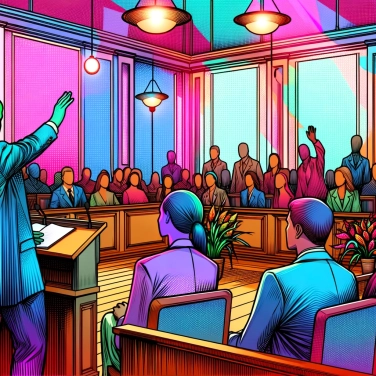A witness may be compelled to testify despite their wish to remain silent due to the legal obligation to cooperate with the justice system. Laws in many countries require witnesses to provide relevant information to help establish the truth during an investigation or trial, and refusing to testify can result in legal consequences.

In a trial, the central objective is to establish the truth of the facts. And the judges, who did not witness the scene, need the people present or involved to accurately reconstruct what happened. Testimony therefore plays a key role, as it provides concrete details, verifies or challenges elements put forward by the parties. Without it, it is difficult to render a fair decision. Even when a witness prefers to remain silent, justice may decide that hearing their account is essential to obtain a complete truth and avoid judicial errors. Not testifying could hinder the emergence of certain evidence vital for a fair trial. So yes, sometimes someone is compelled to speak, but that is because the collective interest, in finding judicial truth and properly administering justice, is deemed a priority.
When living in society, testifying in court is not just an option, but often a true civic duty. This duty exists because justice, to function properly, absolutely needs reliable testimonies. In other words, your testimony helps establish the truth so that judges can make fair decisions. Refusing to testify without a valid reason risks penalties because it is considered an obstruction to the proper functioning of justice. Being a witness, therefore, means playing an active role in helping to maintain a just, balanced, and safe society for everyone.
In France, if you are summoned as a witness by a judge or a court, the law stipulates that you have a legal obligation to come and talk about what you know. It’s a serious responsibility: refusing to testify without a valid reason can expose you to a fine or even prosecution. Of course, the law also provides some small exceptions, like the right not to answer if it might put you in a difficult situation or if your testimony could be self-incriminating. But these cases are quite rare, and generally, you are required to play along and say what you know. This serves to ensure the fairest possible justice: when your testimony is needed, it often really matters to the case at hand.
Even though everyone generally has the right to remain silent in court, this right has its limits. For example, in certain specific cases, such as in front of an investigating judge during a criminal procedure, a witness is required to answer questions, even if they would prefer to remain silent. Another classic situation occurs when the judge believes that the testimony is essential to uncover the truth; they can compel the person to testify, under the threat of sanctions such as a fine or a criminal conviction. However, certain individuals, such as doctors, lawyers, or journalists, have specific exceptions. Similarly, the law protects individuals from being compelled to testify against themselves or their close family members, but aside from these particular cases, one cannot simply say "I prefer not to say anything" without risking legal trouble.
A witness required to speak is entitled to appropriate protection. If testifying exposes them to risks (threats, intimidation, retaliation...), the justice system can ensure their anonymity, secure their personal data, or even provide them with police protection. In some serious cases, psychological support may also be considered, or in extreme cases, completely changing their identity and relocating them elsewhere for their safety. These measures exist so that testifying does not have severe or dangerous consequences for those who cooperate with the justice system.
The witness often receives special protections when testifying in a sensitive case: measures of anonymity, closed hearings, or even enhanced safety arrangements when their testimony poses a significant personal risk.
Contrary to popular belief, the right to remain silent primarily concerns the person accused of an offense, and not the witness. A witness is generally not entitled to remain silent, except in clearly defined exceptions provided by law.
In France, certain individuals may exceptionally be exempted from testifying against their will, such as a spouse, civil partner, or certain close relatives of the person in question.
Did you know that there are specific measures in place to facilitate the testimony of vulnerable individuals, such as children or people with disabilities, thereby preserving their physical and psychological integrity during hearings?
No, the right to remain silent, generally associated with individuals who are accused or implicated, is not absolute for ordinary witnesses. A witness may be required to testify, except in exceptional circumstances, such as professional secrecy, close family ties, or if their own criminal liability could be directly implicated.
Specific measures can be implemented to protect witnesses, such as anonymization during the trial, testimony behind closed doors, or enhanced police protection. These measures aim to ensure their personal safety and physical and moral integrity.
Yes, in certain sensitive cases involving the personal safety of a witness, the law provides for anonymous testimony or testimony given behind closed doors (in camera, video conference). Nevertheless, this depends on national legislation and the severity or specific nature of the case at hand.
A witness generally must answer the questions asked, unless they invoke a reason clearly recognized by law, such as professional secrecy, protection against self-incrimination, or the right to privacy within certain limits established by the legal framework of each country.
A witness who refuses to testify without a valid reason may face criminal penalties, including a fine or even a prison sentence in certain legal contexts. The law regulates this obligation to ensure the necessary cooperation for uncovering the truth.

No one has answered this quiz yet, be the first!' :-)
Question 1/5